Keeping a homestead clean isn’t just about appearances—it’s about efficiency, safety, and maintaining the tools and spaces that keep everything running smoothly. From the garden to the kitchen, natural cleaning practices make it easier to stay on top of everyday messes while staying frugal.
Here on our homestead, we keep things simple and natural. We make the most of what we grow, like using luffa sponges and lemons, and repurpose containers and fabrics to reduce waste. These easy, budget-friendly methods keep things fresh and help us maintain a cleaner, healthier home for our family.
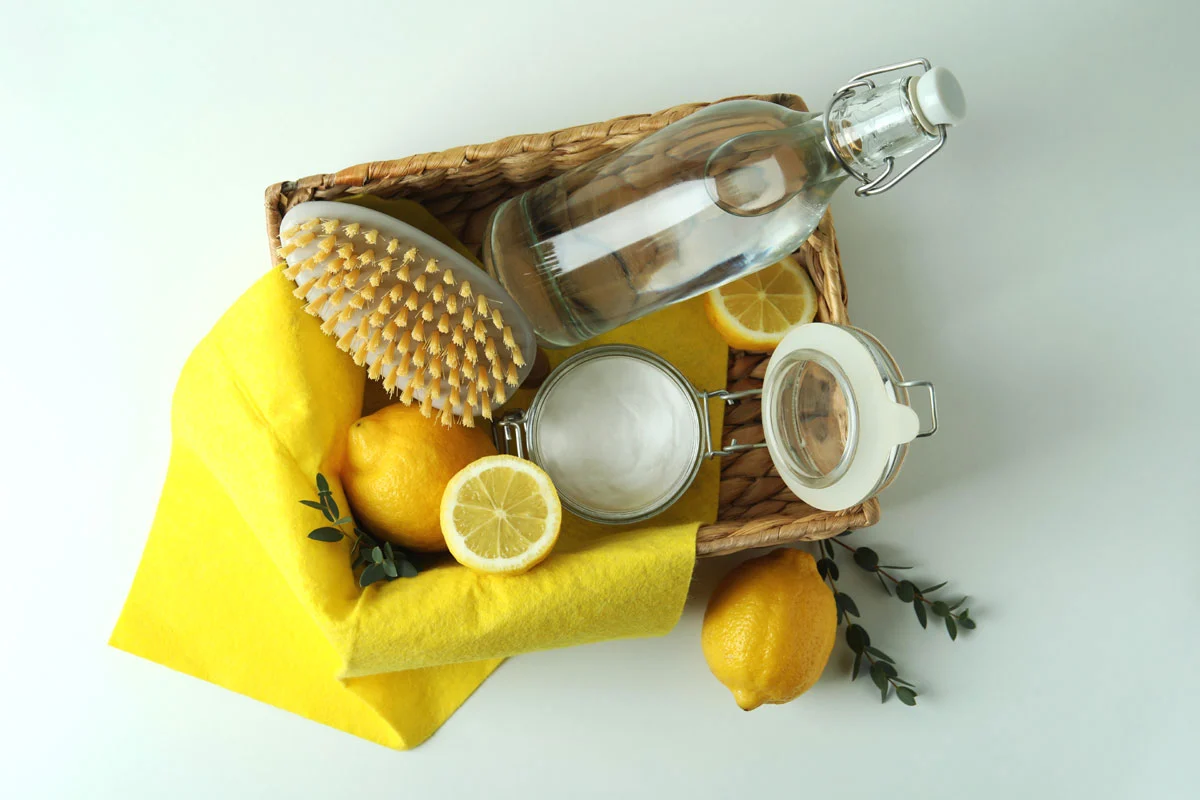
Here are my top 10 homestead-approved natural cleaning tips:
Contents:
- Sunlight as a Natural Disinfectant
- Rubbing Alcohol for Garden Tools
- Lemon and Vinegar All-Purpose Cleaner
- Baking Soda for Stainless Steel and Stovetops
- Luffa Sponges for Sustainable Scrubbing
- Natural Seed Tray & Flower Pot Cleaning
- Natural Chicken Coop Cleaning
- Rain Barrel Refresh
- Stock Up the Frugal Way
- Routine Cleaning and Maintenance
- Final Thoughts
- FAQs
1. Sunlight as a Natural Disinfectant
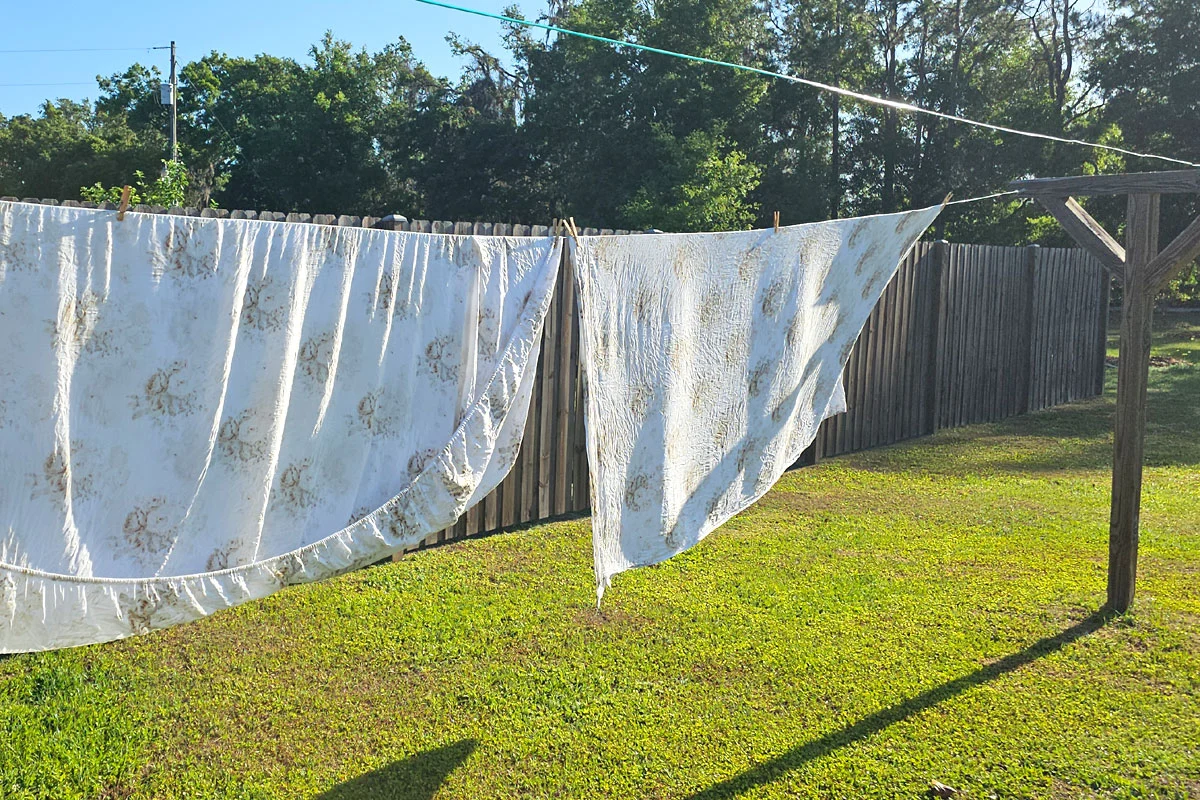
Sometimes the simplest solutions are the best! The sun naturally kills bacteria and odors, making it perfect for freshening up linens, cutting boards, and even musty-smelling rooms.
On sunny days, I lay my area rugs out on the patio to freshen them. I also put seed trays, flower pots, and freshly peeled and washed luffa gourds out in the sun. And we dry a lot of our laundry on a clothesline—saving money while getting the best-smelling laundry that commercial products just can’t match.
- Why It’s Frugal: Free and highly effective.
- How to Use It: Lay cutting boards, rugs, damp boots, pet beds, and more in direct sunlight to disinfect and deodorize.
- Bonus Tip: Flip cushions, rugs, and other items halfway through for even sun exposure.
2. Rubbing Alcohol for Garden Tools
Cleaning and disinfecting your garden shears, pruners, and other tools is crucial for preventing the spread of plant diseases. Rubbing alcohol evaporates quickly and doesn’t leave behind moisture that could cause rust.
I keep a bottle in the garden shed so I can quickly clean blades between plants during pruning season.
- Why It’s Frugal: A small bottle lasts a long time and can help prevent costly plant losses.
- How to Use It: After removing dirt and sap, wipe blades down with rubbing alcohol and let them air dry.
- Bonus Tip: Repurpose an old spray bottle to make application easier—no need for fancy gear.
3. Lemon and Vinegar All-Purpose Cleaner
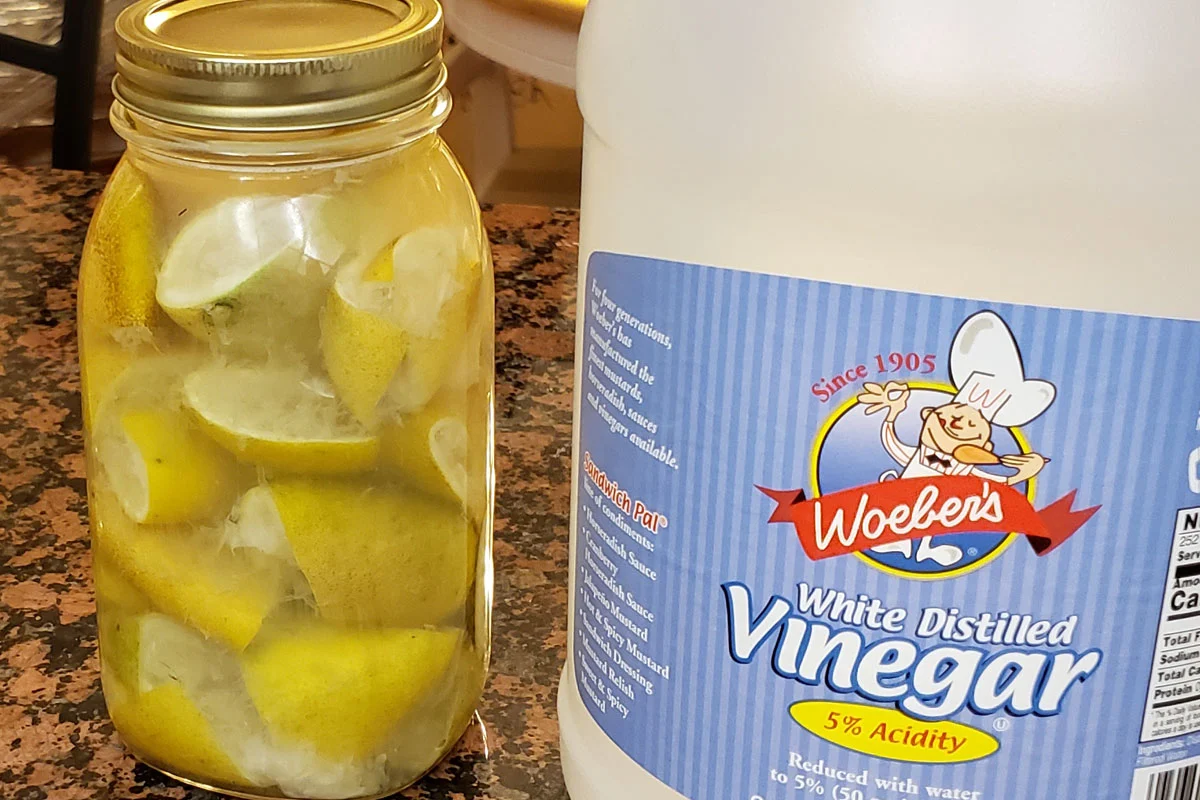
This powerhouse cleaner tackles everything from kitchen counters to garden tools. The acidity of vinegar cuts through grime, while lemon adds a fresh scent and antibacterial properties.
One reason I grow several lemon trees is for a steady supply of this citrus for cleaning and cooking. This simple, homemade cleaner works all over the homestead.
- Why It’s Frugal: Uses kitchen scraps and inexpensive vinegar.
- How to Use It: Soak lemon peels in white vinegar for two weeks, strain, and dilute with equal parts water.
- Bonus Tip: Grab my Lemon Infused Vinegar Cleaning Recipe here!
4. Baking Soda for Stainless Steel and Stovetops
Baking soda is a gentle but effective scrubber for stainless steel sinks and glass stovetops. It lifts grime without scratching and works great on my least-favorite chore—cleaning the oven.
- Why It’s Frugal: Inexpensive, long-lasting, and multi-purpose.
- How to Use It: Sprinkle directly on surfaces, scrub with a damp sponge, and rinse well. Let damp baking soda sit on tough spots before scrubbing.
5. Luffa Sponges for Sustainable Scrubbing
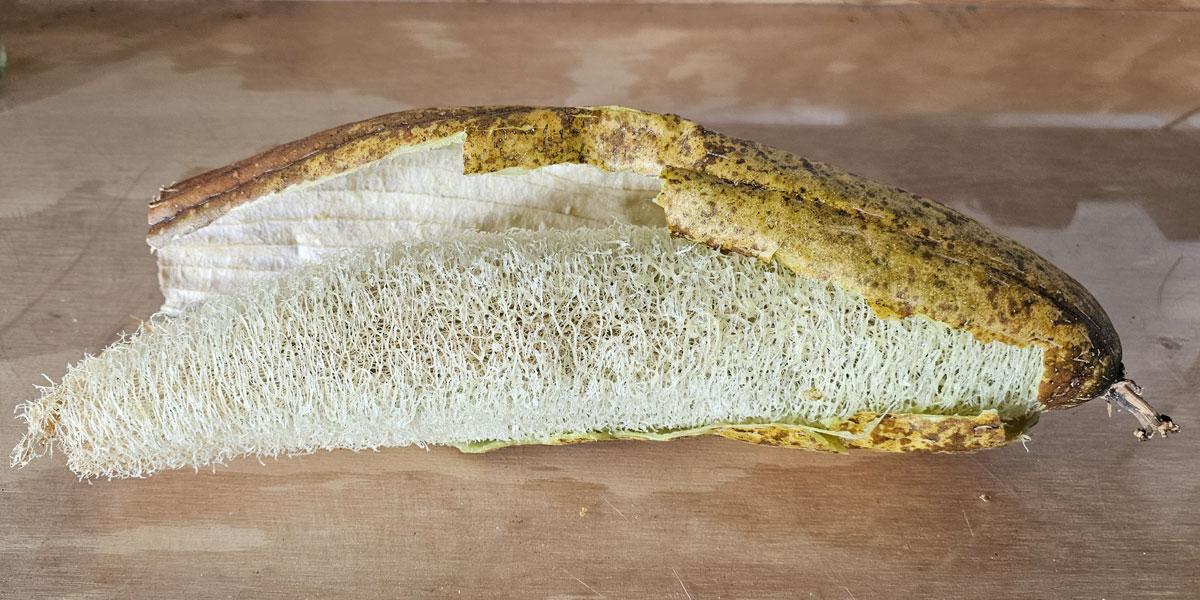
Instead of buying disposable sponges, I use homegrown luffa for scrubbing pots, sinks, and even garden veggies. They’re my go-to for cleaning cast iron, glass, and non-stick cookware.
They also hold up in my husband’s workshop—and when they’re worn out, we compost them.
- Why It’s Frugal: Grown for free, long-lasting, compostable, and seed-saving-friendly.
- How to Use It: Once dried and peeled, use it like any store-bought sponge. Rinse after each use and let dry fully.
- Bonus Tip: Check out my post How to Harvest and Use Luffa Gourds!
6. Natural Seed Tray & Flower Pot Cleaning
Skip the bleach. These simple methods keep your garden gear clean without harsh chemicals.
I soak trays in vinegar and hot water, scrub if needed with baking soda paste, and let them dry in the sun for an extra disinfecting boost.
- Why It’s Frugal: Saves money on replanting and reuses what you already have.
- How to Use It:
- Vinegar Soak: 1:1 vinegar and water, soak 30 minutes, scrub, rinse.
- Baking Soda Paste: For grime, scrub then rinse.
- Hydrogen Peroxide Spray: 3% solution, let sit 10 minutes, rinse.
- Sunlight: Air-dry in direct sun for natural UV sterilization.
- Bonus Tip: Use an old toothbrush to scrub seed tray cells and tight corners.
7. Natural Chicken Coop Cleaning
While I don’t have chickens yet, I’ve learned a lot from seasoned homesteaders and a great chicken-keeping book I reviewed. Natural methods are safer for your flock and easier on your budget.
- Why It’s Frugal: Uses pantry basics you likely already have.
- How to Use It:
- Vinegar & Water Spray: 50/50 mix, spray roosts and walls, wipe down.
- Baking Soda: Sprinkle in nesting boxes to reduce odor.
- Diatomaceous Earth (Food Grade): Use carefully to deter mites and absorb moisture.
- Bonus Tip: Add herbs like mint, lavender, or rosemary to nesting boxes to repel pests naturally.
8. Rain Barrel Refresh
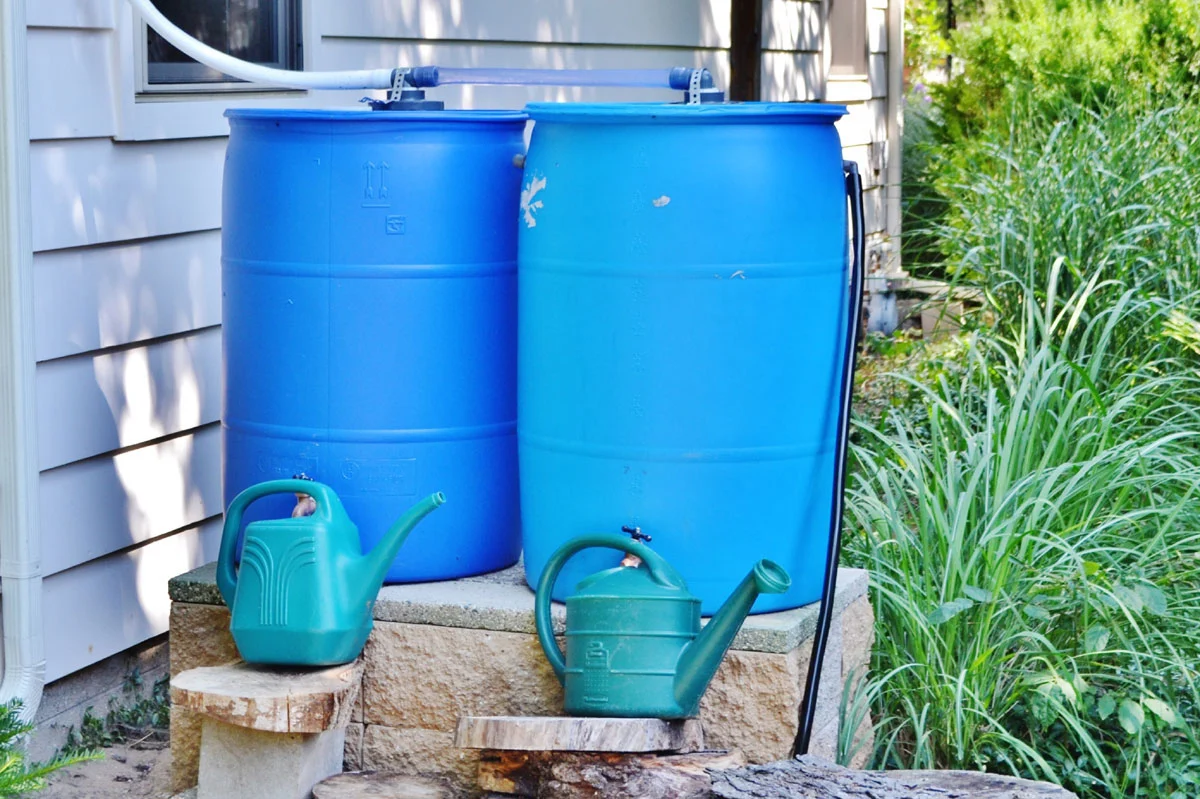
A dirty rain barrel can spread mold, algae, or bacteria. Give it a good seasonal scrub before rainy weather sets in.
- Why It’s Frugal: Protects your plants, your barrel, and your wallet.
- How to Use It: Use a 1:1 white vinegar and water mix, scrub the inside with a soft brush, and rinse well. Let it dry fully in the sun.
- Bonus Tip: I recommend this great blog post on how to clean your rain barrel safely and effectively for more ideas.
9. Stock Up the Frugal Way
From vinegar to castile soap, stocking up on natural staples doesn’t have to be expensive. I keep basics in my pantry and refill when I find a deal. Bulk suppliers like Azure Standard or Costco can save a lot over time.
- Why It’s Frugal: Buying in bulk or reusing what you have = less money, less waste.
- How to Use It:
- Vinegar: Cheapest in gallon jugs at discount stores.
- Baking Soda: Look in the cleaning aisle for 4–5 lb bags.
- Castile Soap: Buy in bulk or through co-ops.
- Essential Oils: Optional—watch for sales or starter kits.
- Brushes, Rags, Bottles: Reuse what you have! Old shirts and toothbrushes work wonders.
- Bonus Tip: Want more DIY cleaning recipes? Grab my free printable: 5 Simple Homemade Cleaners!
10. Routine Cleaning and Maintenance
Small, consistent habits keep your homestead clean and efficient. A little effort each day makes a big difference.
- Why It’s Frugal: Prevents wear and tear and avoids costly fixes.
- How to Use It:
- Daily: Sweep floors and wipe surfaces.
- Weekly: Dust and sanitize high-use areas.
- Seasonally: Deep-clean your oven, tackle storage zones, and refresh supplies.
- Bonus Tip: Let sunlight in! Open blinds and curtains for natural light and a natural mood boost.
Final Thoughts
A clean homestead doesn’t have to rely on expensive store-bought cleaners. With a few simple ingredients and creative reuse, you can keep your home, tools, and workspaces fresh, frugal, and eco-friendly.
Have a favorite natural cleaning tip? Share it in the comments—I’d love to hear what works for you!
FAQs
Yes! Limes and lemons are both citrus fruits high in citric acid, which gives them their natural cleaning power. While lemons are common in recipes, limes work just as well.
Yes! While vinegar and lemon juice are fantastic natural cleaners, they’re both acidic and can damage certain surfaces over time. Avoid using them on:
Natural stone surfaces like granite, marble, or soapstone (they can dull or etch the finish)
Unsealed grout (it can weaken and break down the material)
Cast iron (they can strip seasoning and cause rust)
Aluminum or waxed wood (they may discolor or strip the finish)
For these surfaces, use a mild, pH-neutral soap (like castile soap) mixed with warm water. It’s gentler, effective, and safe for the more delicate areas of your home.
Reuse glass jars or spray bottles from old products. Label everything clearly and store it all in one dedicated spot. This keeps things tidy and simplifies your routine.
Leave a Reply